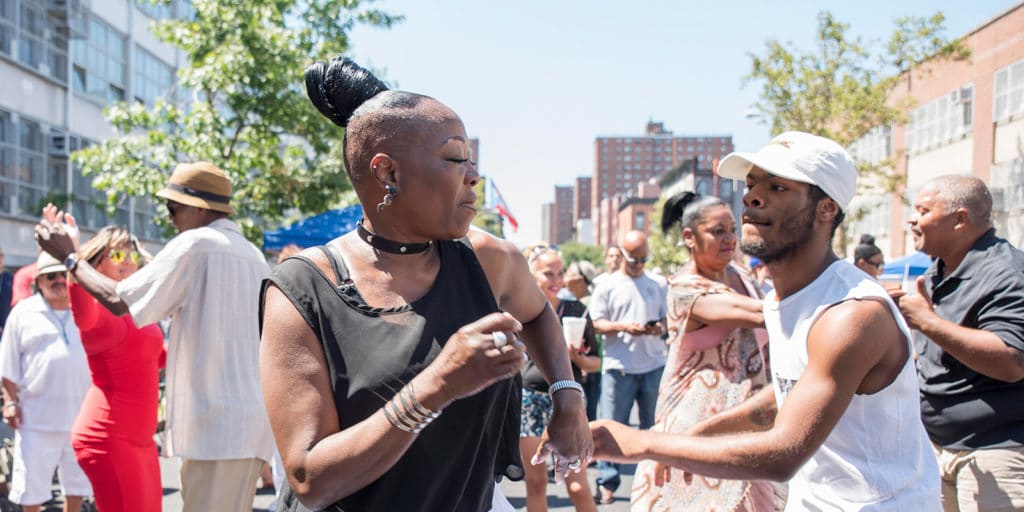The AfriBembé Festival 2021 is the Caribbean Cultural Center African Diaspora Institute’s (CCCADI) end of summer street fair in El Barrio, East Harlem.
Bembé can be an expression of faith or just a party. It’s a coming together with family, friends, and community. There is usually eating, singing and dancing, shopping and lots of talking.
3rd AfriBembé Festival 2021
The CCCADI’s AfriBembé Festival 2021 is at Harlem Art Park in El Barrio, East Harlem on Saturday, August 21, 2021 from 11am – 7pm. FREE cccadi.org
There is a Bembé Stage with live music and DJ sets, a Children’s Village to keep the kids busy, a SoulFull Food Plaza with comfort food, an AfriBembé Marketplace of artisanal arts and crafts, and a Black Dialogue series of panel discussions.
This year’s theme is Black Solidarity. We are living through interesting times, but the real power of humanity is our ability to work together to solve problems.
The CCCADI has New York Puerto Rican founders who are strong Caribbean women with a Pan-African point of view. In the best New York tradition, we celebrate each other.
AfriBembé Festival Cultural Connections
Latin street fairs in New York City are reflections of the patron saint festivals that are the big celebrations in small towns across the Latin world. In West Africa, August is the time of the New Yam Festival. The Haitian Revolution began in August.
Patron Saint Festivals
These small town carnivals are usually the coolest party in the region. The community prepares at least a month or more in advance. There is usually a big public event with more traditions celebrated within the community.
Interestingly, Latin music and dance began as expressions of faith in West and Central Africa. Some of your favorite R&B, salsa and hip-hop moves have been done the same way for hundreds if not thousands of years. Much of the faith has been abandoned, though it’s still around if you learn to read the signs.
Today the saints still support Latin music. When salsa, merengue and bachata bands are not touring, they make a living at home playing patron saint and cultural festivals. Puerto Rico has several festivals across the island every weekend. 🇵🇷
Chinchorros
Eating and drinking with family and friends at roadside bars called “chinchorros” is a Puerto Rican tradition. When you see the booths at a New York street fair, you can’t help but be reminded of the famous row of chinchorros in Luquillo, Puerto Rico. 🇵🇷
New Yam Festival
In West Africa, early August is the end of the rainy season which is celebrated in parts of Nigeria with the New Yam Festival. It is a harvest festival that is also a fertility blessing for the next planting cycle. 🇳🇬
The Haitian Revolution
This year’s AfriBembé Festival 2021 falls on August 21, 2021, the 230th anniversary of the start of the Haitian Revolution on August 21, 1791.
[This may be obvious to you, but born, raised and educated American of the United States, we didn’t know until we moved to Puerto Rico and started studying Haiti.]
Haitians are the only people ever to free themselves and build a nation. Though largely uncelebrated (to discourage copycats), it was a giant human rights achievement. It required defeating France, then one of the world’s strongest military powers. The Europeans couldn’t believe that Africans could defeat them.
The sugar and coffee colony of Saint-Domingue was a center of French power in the Caribbean. The richest French colony in the world attracted other colonizers and was copied around the region.
Saint-Domingue was also a center of African culture. The death camp business model was so brutal that workers didn’t live very long. The African-born who remained at Haitian independence hadn’t been away from Africa for very long, and there had been little mixing, so Haiti’s African culture is strong. Even today, the Smithsonian says the best living example of pre-contact African drumming lives on in Haiti, not Africa.
The turmoil of the Haitian Revolution (1791-1804) caused a diaspora that spread Haitian culture across the Caribbean, including to New Orleans. There is obvious influence in French-speaking places, but also in places that speak Spanish or English. Even the contemporary term “people of color” comes from the French “gens de couleur” which originally referred to the mixed children of plantation owners, the first Creoles.
What Americans of the States call “Creole” is often Haitian Diaspora culture. It can be from many different places, but shares this French African relationship.
Syncopation is an African signature. The Haitian Diaspora put more syncopation into Cuban music and dance. It’s one of the signatures of Latin music.
Black August
“Black August” is a time to celebrate Black freedom fighters. It began as a 1970s California protest against the systemic racism that kills or imprisons people of color. It’s a time to reflect and organize.
2020 was the first year you could say “systemic racism” and most Americans understood what you meant and wouldn’t argue with you about it. For change, unity or solidarity is key. It’s what enabled the Haitian Revolution to succeed. Specifically the union of Creole and African forces made the Revolution successful. We now celebrate the event as Haitian Flag Day.
Bembé
The Festival may seem like just another New York street fair, but there is a lot of culture underneath it. It’s good family fun that is educational too..
See you at the AfriBembé Festival 2021. cccadi.org

